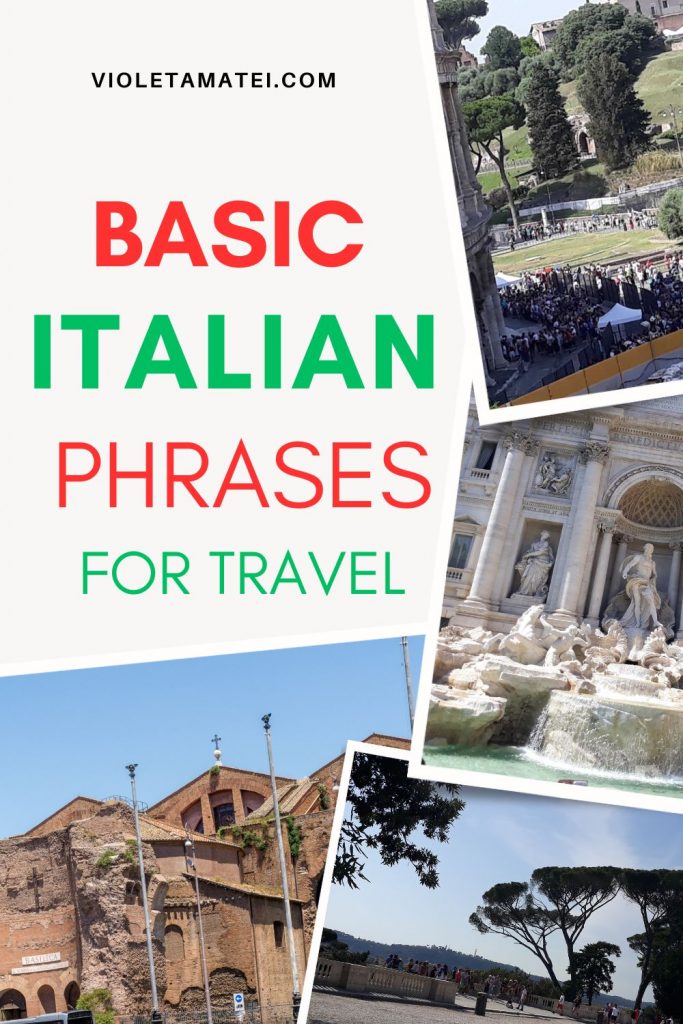Traveling to Italy is a dream for many. The history, art, cuisine, and stunning scenery create an unforgettable experience.
While English is spoken in major tourist centers and in big cities such as Rome, Milan, Bergamo, and Venice, learning basic Italian phrases will help you get around smoothly and interact with locals.
This guide covers must-know terminology for your trip. If you also want to learn how to easily read the numbers check out my article about Roman numerals.
Main Topics of Italian Phrases for Travel
Learn Basic Italian Phrases for Your Upcoming Trip
I think that learning how to say thank you in Italian is the thing to do if you want to build rapport with locals.
Being able to say “please” in Italian will also help you score extra points with local people.
Here are a few more basic greetings you’ll want to learn for your upcoming trip to Italy.
Italian Greetings
Hello – Ciao (CHOW)
Good morning – Buongiorno (BWON-jor-no)
Good evening – Buonasera (BWO-nah-SEH-rah)
Goodbye – Arrivederci (ah-ree-veh-DEHR-chee)
Please – Per favore (pehr fah-VOH-reh)
Thank you – Grazie (GRAHT-see-eh)
You’re welcome – Prego (PREH-go)
Excuse me – Scusi (SKOO-zee)
Use these essential phrases when meeting people and going about your day.
Italians appreciate good manners.
Asking for Help
Do you speak English? – Parla inglese? (PAHR-lah een-GLEH-zay)
I don’t speak Italian – Non parlo italiano (nohn PAHR-loh ee-tah-LYAH-noh)
I don’t understand – Non capisco (nohn kah-PEES-koh)
Please speak slowly – Per favore, parli piano (pehr fah-VOH-reh, PAHR-lee PYAH-noh)
Can you help me? – Può aiutarmi? (pwaw ah-yoo-TAHR-mee)
Where is…? – Dov’è…? (doh-VEH)
Use these phrases when you need assistance with anything during your travels.
At the Hotel – Basic Questions in Italian Language
A room for two, please – Una camera per due, per favore (OO-nah KAH-meh-rah pehr DOO-eh, pehr fah-VOH-reh)
With a double bed – Con un letto matrimoniale (kohn oon LET-toh mah-tree-moh-NYAH-leh)
May I see the room? – Posso vedere la camera? (POH-soh veh-DEH-reh lah KAH-meh-rah?)
Do you have wifi? – C’è il WiFi? (cheh eel wee-FEE?)
What time is check out? РA che ora ̬ il check out? (ah keh OHR-ah eh eel check out?)
Use these key phrases to book your room and handle hotel logistics.
Basic Italian Words for Dining Out
A table for two – Un tavolo per due (oon TAH-vo-loh pehr DOO-eh)
I’d like a/an… – Vorrei un/una… (voh-RAY oon/OO-nah)
The check/bill please – Il conto per favore (eel KON-toh pehr fah-VOH-reh)
Delicious! – Delizioso! (deh-leet-SYOH-zoh!)
Be polite in restaurants and cafes with these essential food-related expressions. Bon appétit!
Basic Italian Phrases for Shopping
How much is this? – Quanto costa questo/a? (KWAHN-toh COH-stah KWEH-stoh/ah?)
Too expensive – Troppo caro (TROH-poh KAH-roh)
Can I pay with credit card? – Posso pagare con la carta di credito? (POH-soh pah-GAH-reh kohn lah KAHR-tah dee CREH-dee-toh?)
Keep the change – Tenga il resto (TEN-gah eel REH-stoh)
Confidently shop with these key Italian phrases. You’ll be bargain hunting at the markets in no time!
Here is an additional paragraph about counting in Italian:
How To Count in Italian
Knowing how to count in Italian is helpful for shopping, paying bills, telling time, etc. The numbers 1-10 are:
1 – Uno (OO-noh),
2 – due (DOO-eh)
3 – tre (tray)
4 – quattro (KWAH-troh)
5 – cinque (CHINK-weh)
6 – sei (say)
7 – sette (SEH-teh)
8 – otto (OH-toh)
9 – nove (NOH-veh)
10 – dieci (DYEH-chee)
For larger numbers, combine the above.
For example, twenty-one is ventuno (vehn-TOO-noh). Also useful are one hundred – cento (CHEN-toh) and one thousand – mille (MEE-leh). Listen for Italians using these numbers and practice counting yourself from one to twenty.
20 – venti (VEN-tee)
30 – trenta (TREN-tah)
40 – quaranta (kwah-RAN-tah)
50 – cinquanta (ching-KWAN-tah)
60 – sessanta (seh-SAN-tah)
70 – settanta (seh-TAN-tah)
80 – ottanta (o-TAN-tah)
90 – novanta (no-VAN-tah)
100 – cento (CHEN-toh)
200 – duecento (doo-EH-chen-toh)
300 – trecento (treh-CHEN-toh)
… and so on; just use the numbers 1-9 and add “cento” which means hundred.
Now you’ll be able to count even higher during your travels through Italy. Being able to state numbers clearly is indispensable when purchasing tickets, asking about dates, handling financial transactions, and more.
Use this starter Italian vocabulary to comfortably get around on your trip. Most Italians will appreciate the effort. Just have confidence, use common sense, and don’t be afraid to laugh at yourself.
Buon viaggio (good trip)!

- Dingli Cliffs: How To Visit Malta’s Highest Point - April 24, 2024
- Blue Grotto Malta - April 23, 2024
- Ramla Beach Gozo, Maybe the Best in Malta - April 9, 2024

